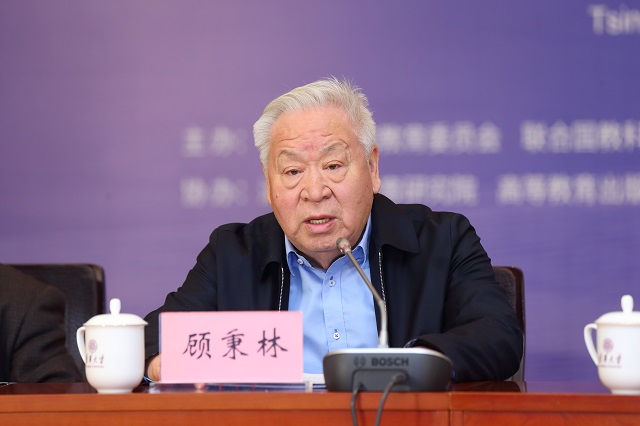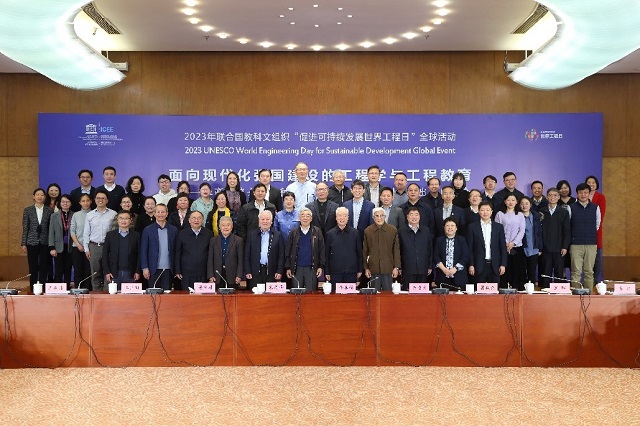Position: Home> Media Center > Events

Editor’s Note: On March 4, 2023, as one of the global events of UNESCO World Engineering Day for Sustainable Development, Engineering and Engineering Education - Monographs of Chinese Academy of Engineering (CAE) Member ZHU Gaofeng and ICEE Book Series Publication Symposium took place at Tsinghua University. The symposium focused on the theme of the new book series of Engineering and Engineering Education by CAE member ZHU Gaofeng, SUN Yongfu, Chinese Academy of Sciences (CAS) member GU Binglin, Prof. YU Shouwen, and ICEE. GU Binglin, former President of Tsinghua University, a member of CAS, Vice Chairperson of the ICEE Advisory Board, delivered a speech. The following are the key points of his speech.
The research and development of engineering and engineering education are of great significance to the development of global economy, science, technology and society and to human advancement, and play a key role in the vigorous Chinese modernization. Facing the complex and changing international environment and scientific and technological competition, as well as the strategic demand of Chinese modernization for engineering and engineering education, we should conduct in-depth research on China’s historical experience, current situation and future trend in engineering and engineering education, and by following the principle of integrating theory with practice, explore and offer practical policy advice. This will undoubtedly facilitate the development of China’s economy and society, and will also serve as a reference for the development of engineering and engineering education in the world.
Tsinghua University has always attached great importance to engineering education. Famous engineering educators such as LIU Xianzhou, ZHANG Wei and ZHANG Guangdou have made groundbreaking contributions to the practical exploration and theoretical research in this respect. In the new century, Tsinghua University decided to establish the Research Center for Engineering Education (the Center) at the end of 2008. As an interdisciplinary and trans-department research institution of Tsinghua University and a research base for the national engineering teaching reform, the Center has undertaken many key projects entrusted by the Chinese Academy of Engineering (CAS), the National Natural Science Foundation of China, the Ministry of Education and other institutions, and made important contributions to the establishment and implementation of the Plan for Educating and Training Outstanding Engineers (PETOE) and to China’s entry into the Washington Accord, an international agreement between bodies responsible for accrediting undergraduate engineering degree programmes.
Since the establishment of ICEE, ZHOU Ji, ZHU Gaofeng and WU Qidi, ICEE has done a great job by undertaking research projects, producing special reports, publishing academic works and holding forums and symposiums, etc. The monographs and book series released today fully reflect the new understanding and thoughts of ICEE members and other experts and scholars on engineering education, and also reveal the heartening achievements made by the researchers of ICEE through long-term hard work.
Since the establishment of ICEE, I have been honored to organize and participate in multiple projects, such as the Research on Engineering Property and Innovation of Engineering Education in Colleges and Universities, the Research on the Development of ICEE in the Context of the Belt and Road Initiative, and the International Cooperation Strategy on Engineering Education: Trends and Frontiers. By getting involved in these projects, I deeply feel the new opportunities and challenges arising from engineering development and the reform of engineering education. Globally, continuous efforts are still needed to improve the teaching mode of engineering education, and solutions to the connection between the engineering education accreditation system and the engineer vocational qualification system are in urgent need. Based on the actual situation in China, we should carry out in-depth study of a series of major issues and figure out the solutions. These issues include how to better establish a diversified and interdisciplinary engineering education mode, how to further strengthen the cultivation of engineering practice ability, how to promote the deep integration of engineering discipline with society, and how to effectively promote high-quality international cooperation in engineering education. This series of important questions require us to conduct in-depth research and seek answers.

Group photo
 京公网安备 110402430053 号
京公网安备 110402430053 号